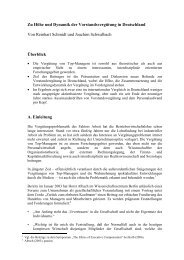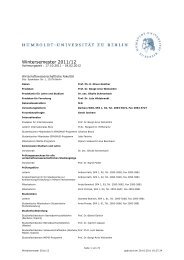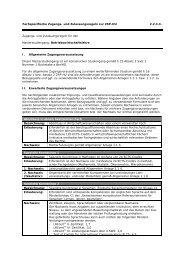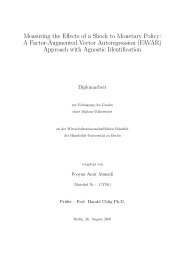Kommentiertes Vorlesungsverzeichnis WS 2012/13
Kommentiertes Vorlesungsverzeichnis WS 2012/13
Kommentiertes Vorlesungsverzeichnis WS 2012/13
Erfolgreiche ePaper selbst erstellen
Machen Sie aus Ihren PDF Publikationen ein blätterbares Flipbook mit unserer einzigartigen Google optimierten e-Paper Software.
enewable energies, energy-saving policies. Institutional aspects such as the flexible mechanisms in the Kyoto-Protocol (CDM and<br />
JI), as well as issues of deforestation and agriculture are also covered. Exercises are included in the course. Participating students<br />
should be interested in mathematic modeling in economics, and be prepared to read research papers in English.<br />
Literatur:<br />
Fischer, C. Newell, R.G. (2008) Environmental and technology policies for climate mitigation. Journal of Environmental Economics<br />
and Management , 55, p.142-162<br />
Goulder, L.H., Mathai, K. (2000) Optimal CO2 Abatement in the Presence of Induced Technological Change. Journal of<br />
Environmental Economics and Management , 39, p.1-38<br />
Jaeger, W.K. (1995) The welfare cost of a global carbon tax when tax revenues are recycled. Resource and Energy Economics<br />
, 17, p.47-67<br />
Nordhaus, W.D. (1993) Rolling the ‘DICE’: An optimal transition path for controlling greenhouse gases. Resource and Energy<br />
Economics , 15,p. 27-50<br />
Unruh, G.C. (2000) Understanding carbon lock-in. Energy Policy , 28, p.817-830<br />
Edenhofer, O., Bauer, N., Kriegler, E. (2005) The impact of technological change on climate protection and welfare: Insights from<br />
the model MIND. Ecological Economics , 54, p.277-292<br />
Hart, R. (2008) The timing of taxes on CO2 emissions when technological change is endogenous. Journal of Environmental<br />
Economics and Management , 55, p.194-212.<br />
IEA-Report: http://www.iea.org/textbase/nppdf/free/2006/weo2006.pdf<br />
Stern-Report: http://www.hm-treasury.gov.uk/independent_reviews/stern_review_economics_climate_change/<br />
stern_review_report.cfm<br />
Organisatorisches:<br />
MA: 6 SP, Modul: "Advanced Topics in Public Economics" oder "Topics in Microeconomics"<br />
Diplom: 4 KP, Wirtschaftstheorie, Wirtschaftspolitik oder Finanzwissenschaft<br />
Prüfung:<br />
Klausur (90 min)<br />
Wirtschaftsgeschichte<br />
701073 European Economic History I (1800-1914) (englisch)<br />
2 S<strong>WS</strong><br />
VL Di 14-16 wöch. SPA 1, 125 N. Wolf<br />
701073 European Economic History I (1800-1914) (englisch)<br />
2 S<strong>WS</strong><br />
UE Mi 12-14 wöch. SPA 1, 21a F. Mihram<br />
UE Mi 14-16 wöch. SPA 1, 21a F. Mihram<br />
The lecture will cover the most important aspects of the European economic development from the turn of the 19th century to<br />
the outbreak of the First World War. Topics include the Industrial Revolution, population growth and migration, international trade,<br />
the Gold Standard, as well as the economics of nationalism, colonialism and war.<br />
Literatur:<br />
Stephen Broadberry and Kevin H. O’Rourke (eds), The Cambridge Economic History of Modern Europe,Cambridge University Press<br />
2010.<br />
Organisatorisches:<br />
MA: 6 SP, Modul: "Economic History"<br />
Diplom: 4 KP, Wahlpflichtfach Wirtschaftsgeschichte<br />
Prüfung:<br />
Klausur (90 Minuten)<br />
7010899 Large Datasets in Economics and Economic History: New Tools for Management<br />
and Analysis (englisch)<br />
2 S<strong>WS</strong><br />
SE Di 12-14 wöch. SPA 1, 21b N. Wolf<br />
Historical and long-run data in economic history often have specific features, such as structural breaks in the data (border changes,<br />
currency changes), a multitude of original sources, and idiosyncratic formats. This seminar deals with tools for the management<br />
and analysis of large, heterogeneous datasets on long-run economic change and economic history. After a general introduction<br />
covering existing datasets, the techniques used for compilation of new data, basic analytical tools and existing data management<br />
solutions, students will work in small groups of 3-4 on projects based on a newly developed web-based software tool. The projects<br />
will involve aspects of data compilation, management, data analysis, and small programming tasks. Examples include data on<br />
the evolution of German Domestic Trade, Italian Foreign Trade 1862-2010, 1885-2010, Regional Employment data for Germany<br />
1895-2010, Prussian Crime Statistics, 1882-1910, or the Economic Geography of Berlin 1936-2006.<br />
Literatur:<br />
Giovanni Federico and Nikolaus Wolf (2011) , Comparative Advantages in Italy: A Long-run Perspective, Banca D’Italia Economic<br />
History Woprking paper No. 9, October 2011<br />
Organisatorisches:<br />
MA: 6 SP, Modul: "Economic History"<br />
Diplom: 2 KP, Wahlpflichtfach Wirtschaftsgeschichte<br />
Prüfung:<br />
Seite 64 von 82<br />
Wintersemester <strong>2012</strong>/<strong>13</strong> gedruckt am 16.11.<strong>2012</strong> 08:15:03


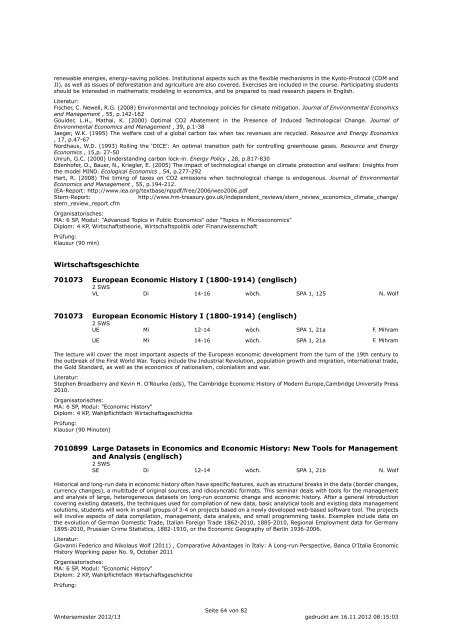
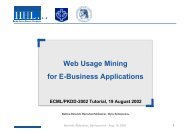
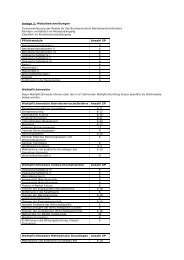

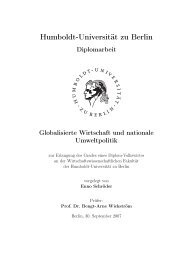
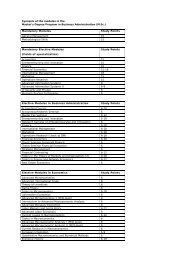
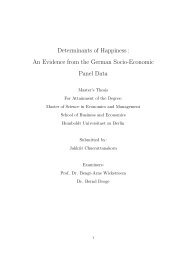
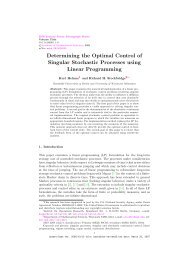
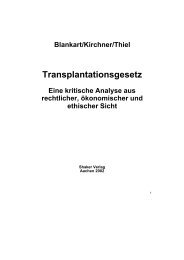
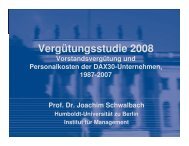
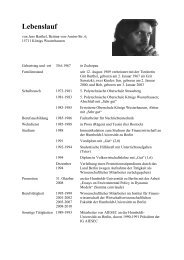
![[Text eingeben] [Text eingeben] Lebenslauf Anna-Maria Schneider](https://img.yumpu.com/16300391/1/184x260/text-eingeben-text-eingeben-lebenslauf-anna-maria-schneider.jpg?quality=85)
